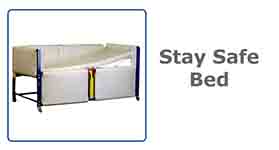Canopy Bed, Crib or Hospital Bed?
Choose the appropriate bed for your
patient
Caring for a patient with a chronic
illness or disability is a challenge. For long-term
home medical care an ordinary hospital bed may seem
to be adequate but could create new problems. The
side rails of a hospital bed are spaced for an
adult and make the bed unsuitable for a child. Crib
bars are closely spaced to prevent a child from
slipping partially through and becoming trapped.
But some patients may get their arms or legs caught
in the crib bars—then a Canopy Bed is the
better choice.
Why is an
enclosure necessary?
Falling from a bed or crib can
cause serious injury. An enclosed bed or a crib
with a top prevents a child from climbing over
the side and falling to the floor. Any patient
who roams unsupervised during the night when
caregivers are sleeping can be a danger to
himself or others in the house. An enclosed bed
is an important safety measure in this case.
Do you need
high or low mattress height?
If you want the patient to be
able to get in or out of bed on his own the
mattress level needs to be low to the ground. If
the patient is not mobile and needs frequent
medical attention you need a crib height mattress
level. The Height- Adjustable Hydraulic Canopy
Bed allows you to raise and lower the bed by a
handoperated crank. The mesh enclosure moves with
the mattress support so no gaps or pouches are
created when you raise the bed.
Do bumper pads
provide enough padding?
If a patient suffers injuries
from seizures or head banging you should choose
the completely padded environment of a Canopy
Bed. Crib bumper pads may not provide enough
protection.
Do you need
head elevation?
Elevating the upper body can be
necessary for the treatment of reflux or
respiratory problems. The standard Canopy Bed has
a fixed position, flat mattress support. An
optional Head Elevation Crank is available. Foam
wedges are also available for head, knee or foot
elevation.
Is the patient
destructive?
The Canopy Bed is made of a
strong polyester mesh and is suitable for most
patients. If the patient is destructive you may
need to consider the Pedicraft Institutional
Crib.
When a crib or
canopy bed is not the solution?
By the time a healthy child is
two years old, he or she will try to climb out of
a crib. It might be tempting for the parent of a
problematic child to use an enclosed crib or bed,
but children who need special attention do not
necessarily need to be confined; the underlying
problems need to be addressed. Some children with
behavior problems need special protection. If you
are concerned that a particular patient is being
treated improperly you should contact your local
child welfare agency for help in evaluating the
situation.
Please remember that the need
for an enclosed crib or bed at home is rare. It
is for a medically fragile patient with chronic
illness such as cerebral palsy, brain trauma or
other severe disability. It must not be used as a
restraint for a difficult, but otherwise healthy,
child or adult.
|





